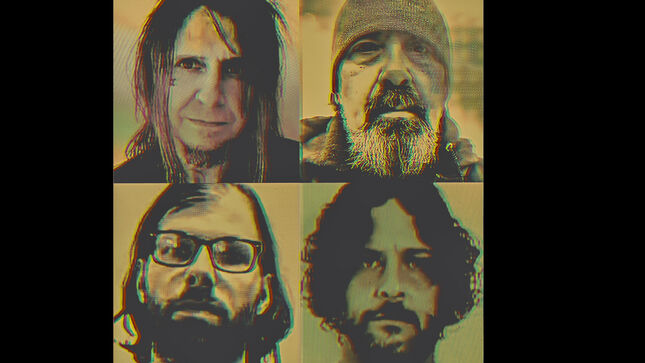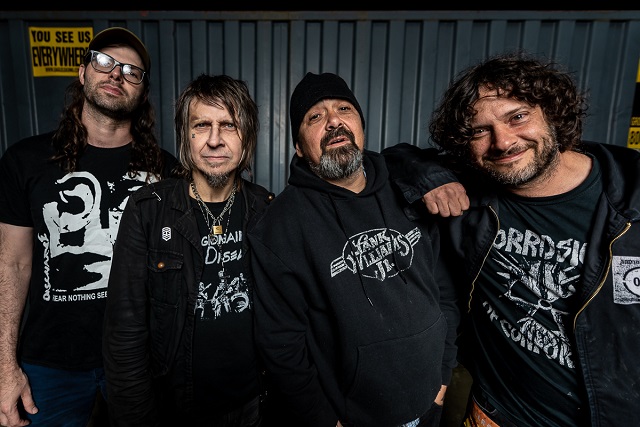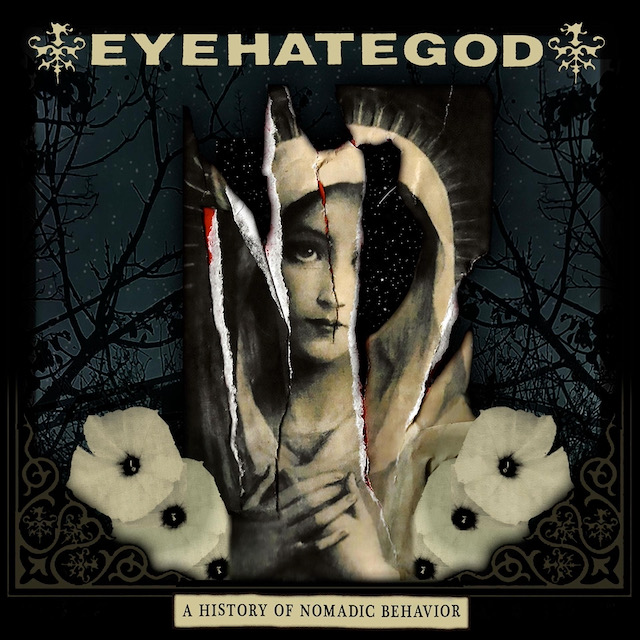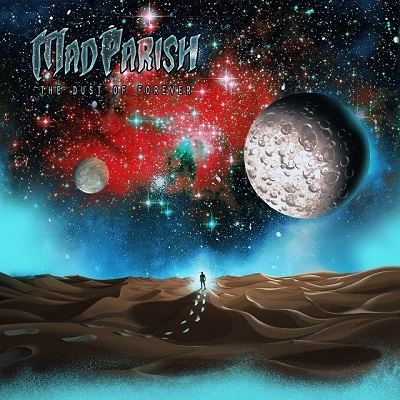EYEHATEGOD – “We Actually Recorded This Album Twice”
March 9, 2021, 3 years ago

Eyehategod never disappoints, and as the band progresses past the third decade of their storied career, the production gets a little better, the songwriting gets a little better; yet the original dirge, sludge, and nastiness of the first couple albums is certainly not lost. Available March 12 via Century Media, A History Of Nomadic Behavior is EHG’s sixth album, the follow-up to the self-titled effort from 2014.
“The big thing for us with this record was, it’s the first record as a four-piece,” begins guitarist Jimmy Bower. “We actually recorded this album twice. We had recorded it the first time with the intention of Brian (Patton, former EHG guitarist) playing on it. Then when Brian departed the band, the songs kind of took on a new life, and we needed to re-record all of it. Again, in true Eyehategod fashion, we’ve had it done… we’ve been working on it for a while, it just took forever for it to come out.”
Bower admits there was some discussion about trying to replace Brian. “We talked about it, and I think through trial and error we realized… we had to make a couple of equipment changes; add another guitar head to give another texture. As opposed to just bumming out on it and trying to find somebody else that probably wouldn’t fit anyway, we just embraced the four-piece thing and dove headfirst into it. We’re excited about it! It definitely sounds different, but not to the point where it doesn’t sound like us. Also, we’ve had this band together for 30 years, so it gives us the opportunity to maybe kind of reinvent ourselves a little bit.”

Not only is A History Of Nomadic Behavior the first Eyehategod album as a four-piece, it’s also the first with Aaron Hill on drums, following the death of previous drummer Joey LaCaze. “True. Aaron’s been in the band since 2013, and his whole bitch and qualm has been – it’s eight years now. He’s like, ‘Dude, I want to be on a release!’ We did the Devo 7-inch thing, a split with Sheer Terror; that was the first thing he was officially on. But yeah, it’s exciting to get a record under his belt, and let everybody that hasn’t seen us with Aaron, give ‘em a chance to listen and realize the uniqueness he has in his own drumming style. He’ll never be Joey, we can never replace Joey, but Aaron’s done a fantastic job at filling those shoes.”
In addition to playing guitar in Eyehategod, Jimmy plays drums in Down. That dexterity would make Bower the perfect tutor for Aaron when he first joined the band. “I didn’t actually get on the kit. I said, ‘Nobody in this band is going to tell you what to play.’ Aaron did a lot of research on the way Joey played, watched a lot of videos. We’re like, ‘Get the gist, get the changes, but make it your own.’ I think that was an advantage for him to know that he had the freedom to add his own little style. It’s done nothing but paid off. He’s a great dude, really stepped in when we needed him; he was also a big fan of the band. Obviously, try and guide him through what we would call tricks, like on the drops, little things like that. But mostly, it’s 99% his doing.”
The saying goes that things happen in threes… A History Of Nomadic Behavior is the first as a four-piece, the first with Aaron on drums, and the first EHG album since vocalist Mike IX Williams’ liver transplant at the end of 2016. “True, yeah, I never thought about that.” Mike’s new lease on life brought about a renewed vigour and enthusiasm from the frontman, as Bower attests to. “Completely. He became more serious as a singer. If you’ve seen us live lately, he’s way more focused. There were periods of Eyehategod where he would sing four songs and pass out. But people expected that and thought it was cool. He’s really stepped up since then. Mike’s a great singer. I think him realizing that he almost died; I definitely thought he was going to die. To have him come back the way he did is just awesome!”
The album title, A History Of Nomadic Behavior, came from Eyehategod being nomads. By definition, a nomad is: a member of a tribe that has no permanent abode but moves about from place to place, usually seasonally and often following a traditional route. With the last EHG record coming out in 2014, this seven-year span is the longest gap between albums; but for three of those years, the band was on the road touring, in support of the self-titled disc. In addition to The United States and Canada, EHG visited several countries they’d never been to before, including Indonesia, South Korea, Vietnam, Thailand, Israel, Tasmania. “It was an honor for one,” says Bower. “A lot of our friends’ bands had done that circuit and had been over there. We’ve heard them talk about how great the shows are. Part of those shows, I didn’t get to do because I had to get my arm operated on. In 2019, I was lifting a bed up before going on tour and ripped my bicep in half. I didn’t know until I got home, how bad it was. We had a bunch of shows from October on still booked. Brian came in and did some of them, and this guy Paul Webb came in and did some of them. But like you said, the three years of constant touring, it drove us insane! At one point we were like, we got to take a break! And it never happened. It’s kind of weird that the COVID thing happened, because we were wanting to take a break anyway – but not this long!”
Looking back on those tour dates, Jimmy recalls that “Singapore was really cool. The Philippines, we got to do Japan again. The only negative was how far the travelling was, being really worn out when landing, and having to play that night. One of the shows we played was on the tenth floor of some old building with no air conditioning, and the amp they had for me kept breaking. But the crowd was insane! It’s always good to play new places, and have the kids check it out – I can say that cause I’m 52 now,” laughs Bower. “But it’s always good to have new people see our shows and be able to play for them.”
Further to Bower’s point that being on the road for so long can drive you crazy, Mike IX Williams has been quoted as saying, “It can get really tense when you’re living so close together for so long. But everybody in the band has got a type of mental illness, which makes us work together really well.” There’s no denying that statement. “It’s so true,” chuckles Bower. “Everybody has their own little quirks. I’m the loud one! I’m getting told to shut up all the time, or quiet down. But it really brought us together as a band, especially as a four piece. We had enough opportunities to really get it tight, the way we really wanted it to be. So, it had its advantages as well.”
A History Of Nomadic Behavior was recorded in two separate places. The music was laid down at High Tower in New Orleans, and the vocals were captured at Hypercube in Chicago. “Yeah, I really wanted to be there when Mike did his vocals. He’s like, ‘Dude, just trust me.’ We would get files back, and damn, he nailed it! I think it’s his best vocal performance yet. He really articulates what he’s saying, which I think is important, because his lyrics are so fucked up! To be able to actually, really understand what he’s saying is a cool thing.”
It’s true. For once listeners aren’t peering intently at the lyrics to figure out what Mike’s saying. “Yeah, it’s really cool. Compared to the past when it was like, what the fuck did he just say?” Current events over the last two years undoubtedly influenced Mike’s lyrics on A History Of Nomadic Behavior. From the racial injustice and riots in The United States, to the Presidential election; that mass media onslaught made it into Mike’s words. “Right. It’s a prime example of him using that towards his advantage. I think Mike did a great job of vocalizing what has been fucked up in the world. I’m really proud of him, he did a really good job! The whole band did. He went above what we thought he was going to do.”
“The Trial Of Johnny Cancer” is a prime example. It’s a little different from the majority of EHG songs in that Mike’s lyrics are more traditional, as opposed to his standard two-word lines or abstract phrases. He sings, “I wanna burn at the stake at the same time as Lady Liberty.” Another line from that same song goes, “You can’t publicly shame yourself when there is no shame.” “He’s the king of those one-liners. He’s very Bukowski-ish to me,” declares Bower. And that song just keeps giving with Williams professing, “I’d rather be a corpse than a coward.” Bold is an understatement. “It’s great, totally killer.”
The shortest song on A History Of Nomadic Behavior is “Smoker’s Place” at an all too brief 71 seconds. It’s instrumental, with a superb blues feel, which is quite divergent for Eyehategod. “That was a thing… we’d get together at the practice room, and we always start off jamming blues – we’ve actually come up with a lot of good riffs doing that. When we were in the studio, we did the same thing. We started off just fucking around with that, and the guy recorded it. We were like, let’s put that on the record and show everybody that we can play a little bit. It was meant to be almost like an intermission. That was a cool piece that stemmed from just jamming in the room, cause Mike never comes to practice. So, it’s just us three. We’ll spend a good hour just jamming, we don’t even look at each other. It’s another thing that’s made us tighter as a band. It’s cool to bring that aspect out to the forefront. We love the blues, and Aaron’s a big Clearlight fan – the band we did 20 years ago, prog rock kind of stuff.” The Mystick Krewe Of Clearlight released a self-titled album in 2000 on Tee Pee Records. “It was that kind of jam, but to be able to put it on the record was cool, and it worked out really good.”

Shifting focus to the cover art for A History Of Nomadic Behavior, it’s classic Eyehategod; there’s no mistaking who this album is from. “That’s all Gary (Mader, bassist). Gary’s been doing all of our art, cause Joey (LaCaze) used to do all of our art, and since he passed away, Gary took it over, and he’s definitely come into his own style with that as well. I wish it was more thought out than it was, but it’s basically like, Gary will say, ‘Dude, I found these fucked up images.’ He’s really good at putting them together. Obviously, it needs to be something sick, something morbid and religious in a weird way. He did a great job with it through, he always pulls through with that.”
It’s kind of funny that it needs to be something sick, because now that record stores basically don’t exist, bands don’t have to worry about their album not being displayed on the shelves because the cover art may offend people. A History Of Nomadic Behavior would certainly be store shelf friendly. “Totally, child safe,” laughs Bower. “In the past, with the cover of In The Name Of Suffering, Century Media changed it to the house, I definitely know what you’re talking about. We’ve been through some weird stuff with the artwork. The second record, Take As Needed For Pain, I remember the owner of Century Media back in the day, Oliver (Withöf), he called me and said, ‘Why do you put Jodie Foster on the cover?’ It’s not Jodie Foster, man. ‘Yes, it is. We’re going to be sued.’ I remember all the controversy behind that. It does look like her, but it’s not her at all! It’s a trip man.”
With touring still uncertain due to the pandemic, Eyehategod has pondered doing an online pay-per-view, with the band playing A History Of Nomadic Behavior live in its entirety. “I’ve brought it up… we did one with Down, and it was really successful, and really fun. Mike lives out of state right now, so that makes it a little hard to do. We’ve been talking about it, so it’s possible that it could happen. It’s basically a plane flight for him. Don’t count us out on it, I think it might happen; but nothing’s been solidified.”
(Photo credit: Travis Shinn)











